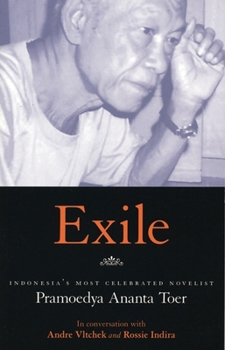Exile: Conversations with Pramoedya Ananta Toer
Indonesia's most celebrated writer speaks out against tyranny and injustice in a young and troubled nation.
Format:Paperback
Language:English
ISBN:1931859280
ISBN13:9781931859288
Release Date:May 2006
Publisher:Haymarket Books
Length:224 Pages
Weight:1.85 lbs.
Dimensions:0.6" x 4.9" x 7.8"
Customer Reviews
1 rating
An interesting conversation with an Indonesian icon
Published by Thriftbooks.com User , 19 years ago
Pramoedya Ananta Toer, who passed away in 2006, was arguably the most important, albeit also the most polarizing, figure in Indonesian literature. His works spanned three generations, from the Sukarno era after the independence of Indonesia in 1945 to his imprisonment and exile to the Buru island during Suharto's rule, and finally to the post-Suharto era (1998-now). In this book, Pram (his nickname) talked openly to Andre Vitchek (a liberal director and author from the San Francisco Bay Area) about his experience and thoughts from his childhood until just a few years before his passing (the conversation took place in 2003). One can imagine that this type of conversation can easily turn into a self aggrandizing and bombastic semi-autobiography that serves no other purpose than to provide a record of Pram's past and career. Indeed in many parts of the book, one can sense the pride, a little arrogance even, coming from the frail but proud man at the twilight of his life. During the time of this interview, Pram was no longer able to produce new writings (in part due to a stroke in 2000), and he spent his days reminiscing and re-evaluating his legacy. From this conversation, it is obvious that he remained a man who would not shy away from expressing his idealistic world views and self-righteousness, despite his physical state and diminishing mental capacity. He talked proudly about "Pramism," his view of the world order that is a combination of nationalism, socialism, and idealism, a reminiscent of Sukarno's Nasakom (Nationalism, religion and communism) ideology. Indeed, Pram professed his undying admiration of Sukarno repeatedly throughout the conversation, and seemed to have the opinion that had Sukarno lived to see his plans through, Indonesia would have been a much better and prosperous nation. However, what makes the book very compelling is Vitchek's astute observations of the Indonesian culture that led to lengthy conversations about "Javanism" and Indonesia's continual failure to rise to the occasion despite having many chances to do so. Through these conversations, the reader is offered a glimpse into the Indonesian way of life (particularly the blind submission to authority) that has existed long before western colonialism and has continued to be a major impediment to progress in the post-Soeharto era. In a lot of ways, the book is a study into Indonesia's psyche throughout its history. Some familiarity with Indonesian history can be very helpful as the conversation invokes many details from Indonesia's past that may not be general knowledge to most. However, the book also does a good job of providing some lead in by including at the beginning of the book a short narrative of Indonesian history from just before the colonialism era to the collapse of the Suharto regime. It is rather ironic that for a man who champions independence, critical thinking and self-determination as much as Pram does, one cannot help to sense that he





